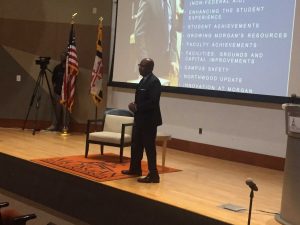Though there wasn’t a large turnout, the Morgan State University students in attendance had tough questions for Morgan’s president at the annual fall town hall, Thursday.
Morgan State University President David Wilson hosted his town hall to not only hear student’s concerns but also address all the success the University has seen in the last year.
Wilson began the engagement with an explanation of retention and how it affects students. Addressing the freshman class directly, Wilson expressed his satisfaction with the size of the incoming class.
“We have nearly 1,200 new freshmen, the highest number of new freshman we’ve had at Morgan in seven years…representing more than 40 states and 60 countries,” said Wilson.
With such a large incoming freshman class, there have been issues with student housing, or the lack thereof for months. Wilson described this as “the perfect storm.”

According to Wilson, the University’s had an successful rise in retention rates, that the number of returning sophomore and incoming freshman students outnumbered available space on campus. In response, the University has rented 32 rooms in a local hotel, currently housing 50-60 students. The University and Wilson plan to have students moved from the hotel and onto campus by Oct. 26.
Following Wilson’s presentation, students voiced concerns over a number of topics, including housing and the lack of appropriate accommodations on campus.
Third-year journalism student and campus resident, Adjua Thomas expressed disappointment in her dormitory’s lack of wi-fi during mid-term exams.
“It’s absurd that we didn’t have wi-fi during midterms, you couldn’t even submit your papers on time…if you’re doing a test online and it glitches, that’s the end of the test.”
Thomas, who is the student president of her housing complex, Marble Hall Gardens, acknowledged that there have been improvements made to the dorm’s wi-fi and internet access before, but those changes did not last long. In the three years she’s lived on campus, not much has improved. In fact, Thomas feels that conditions are getting worse.
“There used to be transportation to my dorm off-campus…I don’t feel safe walking the streets of Baltimore at night,” Thomas said.
Among other student concerns, campus meal plans were also addressed at the town hall. Third-year student and psychology major, Dasianna Coates expressed her concern to Wilson over food safety and quality at Rawlings Hall, the main dining hall on campus.
“People are eating there and getting sick,” said Coates. “My friends are getting food poisoning eating there [Rawlings] and nobody’s listening to us.”
Wilson said he’d investigate Coates’ concerns, but explained that Morgan’s food vendors are under contract with the University. Wilson did not reveal how long the university has been under contract with this vendor, but did say that contracts typically last five years. Wilson added that he and his administration are working on procuring a new contract with a different food vendor.
“We are in the process of putting together an RFP, Request for Proposal that will go out in spring of ‘18, then other food service vendors will have an opportunity to bid on the contract,” Wilson added.
Jatia Mills, junior and senator of the Student Government Association expressed her appreciation for the gathering, but says she wasn’t happy with the lack of promotion for the town hall.
“I really enjoyed the town hall,” Mills said. “I love the concept of keeping students involved.” Mills argued that the university should do more to promote town hall meetings with the president.
“They don’t want students here complaining and having the guests that come to the town hall, seeing how Morgan really is,” Mills added.
Comments about disability accommodations were also discussed during the Q&A portion of the town hall.
Sophomore social work major, Kenneth Clark communicated his concern over the lack of appropriate accommodations for disabled students.
Describing his experience on campus as “almost discriminatory,” Clark spoke passionately about the issue.
“We need to be accommodated,” Clark said. “If a student gets an accommodation sheet and the professor signs off on it, they need to be aware of what they are signing.”
Clark attended last year’s town hall as well and said that since the last meeting nothing has changed. Clark feels that faculty are not familiar with the American Disability Act and that hinders their ability to teach disabled students properly. Speaking directly to Wilson, Clark said that he will not support a university that does not give him proper accommodations.
“I will not support a university where I am using my money, student loans, private scholarships, and money that’s being sponsored to me,” said Clark. “We are creating a culture and an environment where students who don’t know how to properly advocate for themselves are getting lost in the crevices.”
The meeting ended on high note, with Wilson and his administration, promising to address everyone’s concerns in the coming weeks.
















